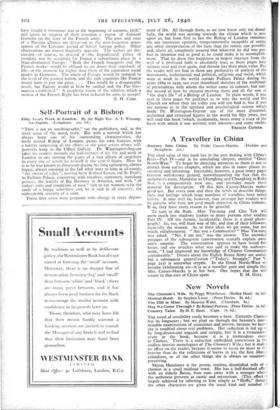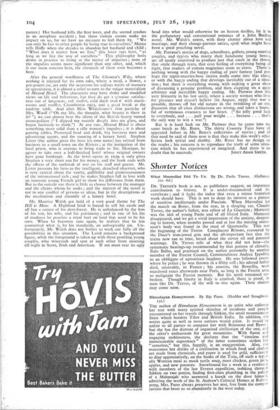New Novels
THE novel of sensibility easily becomes a bore. Certainly Clarissa has its langueurs ; but we plod on through the heroine's inter- minable examinations of conscience and motive, because we know she is troubled about real problems. Her seduction is led up to by long-drawn-out anguish and scruple, but it is a tremendous event in the book, because it is a tremendous event to Clarissa. There is a seduction embedded somewhere in the endless interior monologues of The Chemist's Wife ; but it makts no effect on the reader, because it seems to mean no more to ti- heroine than do the reflections of leaves in ice, the first Marc celandines, or all the other things she is always so sensitively perceiving.
Minna Hansbawe is the pretty, restless, dissatisfied wife of a chemist in a small midland town. She has a half-finished afar with an elderly Baron, then runs away with a stranger whoa the authoress presents as exotic and mysterious. (This effect Is largely achieved by referring to him simply as "Hoffe," thong the other characters are given the usual kind and number ef
names.) Her husband kills the first lover, and the second crashes in an aeroplane accident ; but these violent events make no impact on us, for we have no measure to feel them by. "We can only be fair to other people by being true to ourselves," Minna tells Hoffe when she decides to abandon her husband and child ; "What does it matter how we live," this lover says later, "as long as we live the way of ourselves." This philosophy boils down in practice to living at the mercy of impulses ; none of the impulses seems more significant than any other, and, which is our main concern here, the chronicle of them soon becomes a bore.
After the general woolliness of The Chemist's Wife, where nothing is enjoyed for its own sake, where a meal, a flower, a pot-pourri jar, are only the occasions for tedious trains of memory or speculation, it is almost a relief to turn to the vulgar materialism of Mistral Hotel. The characters may have shaky and muddled views on life and behaviour, but they do get a genuine satisfac- tion out of langouste, red mullet, cold duck stuff it: with mush- rooms and truffles, Chambertin 1923, and a good break at the roulette table. And after Miss Whitehouse's thin pastiche of Mrs. Woolf (" Oh my life, she thought, what beauty is there in it? "), we can almost bear the idiom of the British hearty turned cosmopolitan (" I dipped my muzzle deeply into my glass, and began furiously to think.") At any rate, Mistral Hotel is about something more solid than a silly woman's impulses ; it is about gaming tables, Provencal food and drink, big business men and advertising agents, and the running of a luxury hotel. Stephen Lister (the author gives the hero his own name) has retired from business to a small town on the Riviera ; at the instigation of the local priest, who is anxious to bring trade to Ste. Monique, he agrees to take over a half-finished hotel whose original owners have gone bankrupt. As the hotel opens in 1939, it only gives Stephen a very short run for his money, and the book ends with the effects of the outbreak of war on his staff and guests. Mr. Lister presents his hero as the intelligent, detached observer, who is very cynical about the vanity, gullibility and promiscuousness of the international rich ; and he makes Stephen fall in love with an innocent young French girl to show his difference from them. But to the outside eye there is little to choose between the manager and the clients whom he soaks ; and the interest of the novel is not in any conflict of persons or ideas, but in the descriptions of the mechanism and clientele of a luxury hotel.
Mr. Maurice Walsh got hold of a very good theme for The Hill is Mine. A Highland laird is forced to sell his castle and all but a corner of his deer-forest. He is unbalanced by the loss of his son, his wife, and his patrimony ; and in one of his fits of madness he poaches a royal hart on land that used to be his own. When he becomes sane again, he realises that he has committed what is, by his standards, an unforgivable sin. Un- fortunately, Mr. Walsh does not bother to work out fully all the possibilities in this situation. The Laird remains a background figure, while the foreground is taken up with three prattling young couples, who wisecrack and spar at each other from morning till night in Scots, Irish and American. If sex must rear its ugly
head into what would otherwise be an honest thriller, let it be the perfunctory and conventional romance of a John Buchan novel. Mr. Walsh's sextet, with their chatter about love and marriage, and their change-partner antics, spoil what might have been a good poaching novel.
Mr. Pertwee's stories of dogs, schoolboys, golfers, young married couples, and typists who marry their handsome young bosses, are all neatly contrived to produce just that catch in the throat, that smile through tears, that cosy feeling of everything being all right, that readers of certain magazines seem to crave. There is nothing wrong with the happy ending of pure fantasy (and per- haps the typist-marries-boss stories really come into this class), or with the happy ending that develops inevitably out of a situa- tion ; but there is everything wrong with making a great show of discussing a genuine problem, and then clapping on a quite arbitrary and incredible happy ending. Mr. Pertwee does this very blatantly in his last story, where a society woman who lives for pleasure and doesn't believe (in August, 1939) that war is possible, throws off her old nature in the twinkling of an eye, discovers that all class distinctions are wrong, and takes a house- ful of verminous evacuees to her heart. (" So jolly good luck to everybody, and . . . pull your weight . . . because . . . that's the only way to win a war.")
But it is hard luck on Mr. Pertwee that he came into the same batch as Mr. Bates. The thirty Country Tales have all appeared before in Mr. Bates's collections of stories ; and all that need be said of them now is that they make this week's other fiction look trivial and shabby. Mr. Bates has no design on the reader; his concern is to reproduce the truth of some situa- tion which he has experienced or imagined. And there is no































 Previous page
Previous page